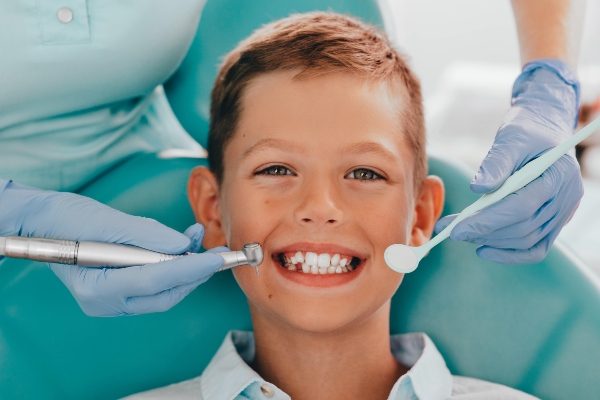 Brushing and flossing properly on a daily basis can help your children enjoy the benefits of better oral health. Pediatric dentistry visits also help prevent some of the more common dental issues seen in young patients while promoting fresher breath, a whiter smile, less oral pain, and strong teeth and gums. By having the teeth cleaned and evaluated by a professional every six months, you can help your child avoid unnecessary symptoms and complications from common but often serious dental problems.
Brushing and flossing properly on a daily basis can help your children enjoy the benefits of better oral health. Pediatric dentistry visits also help prevent some of the more common dental issues seen in young patients while promoting fresher breath, a whiter smile, less oral pain, and strong teeth and gums. By having the teeth cleaned and evaluated by a professional every six months, you can help your child avoid unnecessary symptoms and complications from common but often serious dental problems.
Common dental issues in children
Every child is unique. Some are more prone to dental problems than others. No matter what your child's dental and medical history, routine oral health exams play an essential role in maintaining a healthy mouth and protecting against unwanted and avoidable issues.
Cavities
One of the most common oral health problems for both adults and children alike is tooth decay. When the enamel surface of a tooth is damaged or worn down from acid erosion, bacteria can penetrate and start to break down the tooth, resulting in a cavity. Children are especially prone to this problem because baby teeth have a thinner, weaker enamel coating than permanent teeth. Kids are also more likely to participate in activities and consume foods or drinks that can increase the risks for cavity development.
Another common reason for tooth decay is the buildup of plaque on the surfaces of teeth. Over time, this can harden and turn to tartar buildup, a tough film that cannot be removed with just a toothbrush and floss. Dentists and hygienists can remove tartar at regular pediatric dentistry checkups, better protecting a child's mouth from decay. Fluoride treatments and dental sealants can also be used to prevent cavities.
Gum disease
Similar to tooth decay, gum disease can also be caused by plaque and tartar buildup, especially between teeth and along the gum line. It can be difficult for children and parents alike to thoroughly clean teeth close to the gum tissues. Professional cleanings help keep this buildup under control, resulting in less inflammation and tenderness in the gums. This helps prevent the development of gum disease, which can be serious if left to progress without intervention.
Thumb-sucking and pacifier use
While both of these practices are completely normal in babies and toddlers, some children continue sucking their thumbs or pacifiers well into the preschool and school years. When such practices still continue around age five or last for several hours each day, it can affect the development of a child's palate as well as the position of future permanent teeth. Dentists can monitor the development of a child's teeth and bite pattern at each checkup to give parents timely guidance on when and how to successfully wean their child from these habits. The right timing can prevent serious issues with alignment, bite, and speech.
Conclusion
Pediatric dentistry can be used to not only treat serious oral health issues but to prevent them from happening in the first place. Regular exams help patients maintain a healthier mouth while allowing dentists to catch potential issues before they develop into major problems.
Request an appointment or call Manvel Pediatric Dentistry at 832-645-2848 for an appointment in our Manvel office.
Related Posts
Dental injuries can be common during childhood, but prompt treatment from a pediatric dentistry professional can help restore your child's smile. It is important to have chipped, cracked, broken, or knocked-out teeth evaluated by a dentist, even if the patient is a child and only their baby teeth are affected.There are many types of dental…
One of the goals of pediatric dentistry is to make sure kids understand the value of oral health. This is possible with the help of parents or guardians. First-time parents can consult the pediatric dentist about what to do. If you want to know how to teach your kids proper oral hygiene habits, here are…
Dental injuries are relatively common in younger children. Many parents wonder if pediatric dentistry treatment is necessary, especially when it comes to baby teeth. However, many of these types of injuries require prompt evaluation from a dentist, even if the damage seems minor and there is no pain. Failing to have your child evaluated quickly…

